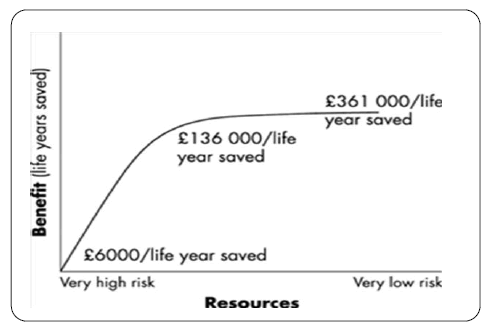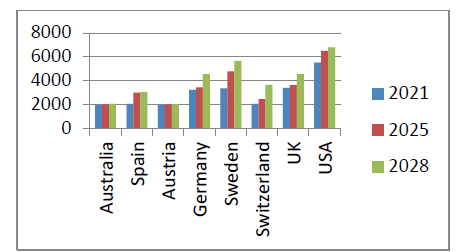Market Analysis, J Trauma Stress Disor Treat Vol: 8 Issue: 4
2020 Market Analysis of 7th International Conference on Depression, Anxiety and Stress Management
Elia Gourgouris
The Happiness Center, USA, E-mail: Dreliagourgouris@msn.com
Keywords: Mental disorders, psychological, neuropsychiatric
Market Analysis
Mental disorders are one of the top public health challenges in the WHO European Region, influencing about 25% of the population consistently. In all countries, mental health problems are more prevalent among those who are most deprived. The WHO European Region therefore faces different difficulties affecting both the (psychological) well-being of the population and the provision and quality of care for people with emotional problems.
Mental disorders are one of the hugest public health challenges in the European Region as measured by prevalence, burden of disease or disability. It has been estimated that psychological disorders affect more than a third of the population every year, and the most common is depression and anxiety. Depressive disorder is twice as common in women when compared to men. About 1–2% of the population is diagnosed with psychotic disorders, men and women equally, and 5.6% of men and 1.3% of women have substance use disorders. In all countries, mental disorders tend to be more prevalent for those who are most deprived.
About 14% of the global burden of disease has been attributed to neuropsychiatric disorders, as by 2020, it is estimated to be that the burden of a mental disorder will have to be increased to 15% of the Disability Adjusted Life Years, which is termed to be (DALYs). Such estimates have drawn helpfulness to the importance of mental disorders for public health. The problem of mental disorders is likely to have been misjudged because of inadequate appreciation of the connectedness between psychological illness and other health disorders.
The wider impacts of mental ill health result in around £26 billion each year in total economic and social costs to Barcelona.
The wider impacts of mental ill health affect almost every aspect of a person’s life, from their education and employment to their physical health and the quality of their relationships. Across the population, the net effects of these wider impacts substantially affect Barcelona’s economy, infrastructure and population. Because of this, mental health is not simply an issue for health and social care.
Unfortunately, mental ill health remains one of the least understood of all health problems, and stigma stops people from addressing it. It is time we faced up to mental ill health and the effects it has on our community. To that end, this report seeks to shed some light on the scope and scale of mental ill health in Barcelona.

Barcelona’s total estimated population for 2013 is approximately 8,400,200 people. Although the above statistic would indicate that 2,100,050 of them will experience clinical levels of mental ill health this year, calculating the actual figures is far more difficult. Many factors, such as age, gender and lifestyle, may contribute to a person’s likelihood of developing mental ill health, and some people may experience more than one mental disorder during the course of their lives or even at the same time. Rather than arriving at a sum total, this report seeks to understand mental health in Barcelona by looking at how mental ill health is manifested in the city. It considers how common certain conditions are in Barcelona and seeks to give a picture of mental health across our lifetime – from children and young people, to working age adults to older people. Finally, it looks at how mental ill health varies across different aspects of our community, such as gender and ethnicity. 65,000 Barcelona live with dementia and, if Barcelona follows the predicted national picture, numbers will almost double within the next 30 years.
Importance and Scope of Psychiatry & Psychosomatic Medicine
In any given year, an estimated 1 in 4 individuals will experience a diagnosable mental health condition. A third of these will experience two or more conditions at once. Mental ill health is the single largest source of disease burden, more than cancer and cardiovascular disease, and the costs extend well beyond health and social care. Close to £7.5 billion is spent each year to address mental ill health in the Barcelona community. This includes spending on health and social care to treat illness, benefits to support people living with mental ill health, and costs to education services and the criminal justice system. However, these costs are only a part of the total £26 billion lost to Barcelona each year through such issues as reduced productivity and reduced quality of life. Psychiatry & Psychosomatic medicine conference 2020 will provide an opportunity for all stakeholders working on mental health issues to talk about their work.
It is costing government:
Mental ill health impacts the most vulnerable the most, and many of the related costs fall to the public sector. At least 1 in 10 children is thought to have a clinically significant mental health problem, meaning 111,000 young people in Barcelona. The impacts of childhood psychiatric disorders cost Barcelona’s education system approximately £200 million per year. It also costs to social care. Forty five per cent of looked after children aged 5 to 17 experience a mental health disorder, and 65,000 older Barcelona experience dementia (a figure that is expected to almost double over the next 30 years). In social care costs alone, Barcelona boroughs spend around £550 million a year treating mental disorder, and another £960 million is spent each year on benefits to support people with mental ill health. These costs do not even tackle the problem. Informal and unpaid careers are left to contribute £1.2 billion worth of support each year to people with mental disorders.
It hinders the economy:
Though diagnosis rates lag significantly behind most physical illnesses, an estimated 914,300 adults of working age in Barcelona are affected by a common mental disorder such as anxiety and depression. Many more are affected by a severe and enduring mental ill health. Mental ill health hampers Barcelona businesses each year by limiting employee productivity and reducing the potential workforce. £920 million alone is lost annually to sickness absences in the city, and a further £1.9 billion is lost to reduced productivity. The costs extend more widely, though, to amount to a staggering sum total of £10.4 billion lost each year to Barcelona business and industry.
It raises the costs of crime:
Individuals with mental ill health are more likely to be the victims of crime than the perpetrators, but the costs to the criminal justice system are significant. The Barcelona criminal justice system spends approximately £220 million per year on services related to mental ill health, and other losses such as property damage, loss of stolen goods and the lost output of victims cost Barcelona another £870 million each year.
The current solutions are not sustainable:
As stated earlier, roughly £7.5 billion is spent each year in Barcelona to combat mental ill health. Health costs for treating mental disorder amount to £2.8 billion per year, and another £550 million is spent on social care. These costs are already too high, and treatment costs are expected to grow over the next two decades. Mental health issues also prevent physical health conditions from being addressed properly. Roughly £1 in every £8 spent on long-term health conditions can be linked to poor mental health, which translates to an additional £2.6 billion in treatment costs each year in Barcelona.
Despite these substantial costs, diagnosis and treatment rates for mental disorders are poorer than most physical health conditions, meaning that even with these large costs we are not sufficiently addressing the problem of mental ill health in our community. The costs are being felt elsewhere, in schools and businesses, crime and families.
Mental health is more than mental ill health:
Barcelona also has the SPAIN’s highest proportion of the population with high levels of anxiety. Nearly half of Barcelona is anxious, and almost a third report low levels of happiness. Life satisfaction and feelings of worth are lower than the national average. If we can begin to address these very basic and too-often ignored problems in our city, we can begin to unburden ourselves of both the moral and economic costs of mental ill health. Foreign partners will reach $227 billion this year and will grow steadily over the coming years.

Target Audience:
1. Psychiatry Scientists/Research Professors
2. Physicists/Chemists
3. Junior/Senior research fellows of Psychology Field
4. Directors of Pharmaceutical companies
5. Members of different Psychiatry associations
6. Student from psychology department
7. Clinicians
8. Mental Health Practitioners
9. Graduates from health sciences and psychology
10. Registered Nurses, Geriatric Nurses, Public Health Nurses or Clinical Nurse Specialists
11. Students participating in the Master Health Sciences
12. Rehabilitation Care Practitioners
13. Neurologists
14. Individual hospital facility is benefited as this facilitates them of the hospital and perceives what services are needed by the customers of the hospital and the way will they be funded.
15. Pharmaceutical and health insurance corporations will be benefited as this may facilitate in understanding the demand and provide varied health and insurance products and evaluate the economic viability of the same for the company.
Related Companies/Industries:
1. Forest Laboratories
2. Solvay of Belgium
3. GlaxoSmithKline
4. Pfizer
5. Lund Beck
6. Bristol-Meyer Squibb
7. Oregano International
8. Universal Health Services Inc.
9. Fujisawa Pharmaceutical
10. Meiji Seika
11. Janssen Ph.
12. Novartis
13. Merck
14. Johnson and Johnson
15. Roche
Related Associations and Societies:
1. The American Psychosomatic society
2. The Japanese Society of Psychosomatic internal medicine.
3. International Society of Ethical Psychology and Psychiatry
4. Brazilian Psychiatric Association
5. American Psychiatric Association
6. Professional association of specialists in psychosomatic
7. Psychosomatic associations in internal diseases
8. Asian Cognitive Behavioral Therapy Association
9. World Psychiatric Association
10. Active Minds
11. American Association of Suicidology
12. American Foundation for Suicide Prevention
13. Brain and Behavior Research Foundation
14. Center for Psychiatric Rehabilitation
15. The National Association of Psychiatric Health Systems.
16. The National Alliance on Mental Illness.
17. The Australian & New Zealand Association of Psychiatry, Psychology and Law
18. Psychotherapy and Counseling Federation of Australia
19. Australian Society for Psychological Medicine
20. The European Association of Psychosomatic medicine.
21. European Mental Health association.
 Spanish
Spanish  Chinese
Chinese  Russian
Russian  German
German  French
French  Japanese
Japanese  Portuguese
Portuguese  Hindi
Hindi 
